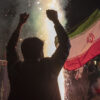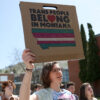As we inch closer to the April 1 by-elections in Burma, during which Aung San Suu Kyi and her National League for Democracy (NLD) will contest some 46 parliamentary seats, Western observers need to step back, assess the conditions on the ground, and determine whether the recent reforms in Burma—coupled with a free and fair election—merit easing sanctions.
Indeed, European nations (and the U.S. to a lesser degree) are touting successful elections as the benchmark for lifting sanctions, yet at a panel discussion hosted by Walter Lohman and The Heritage Foundation on Wednesday, Lorne Craner, president of the International Republican Institute, advised against jumping the gun after the elections.
To Craner, the elections are an important development, but they are merely the first step toward truly free and fair national elections in 2015. There should be a positive, concrete U.S. government response to the April balloting, but we are a long way from normalizing relations.
Craner highlighted key benchmarks for determining whether the election is free and fair—before, during, and after the election itself. Before the election, political parties must be able to campaign freely—the Burmese government has largely allowed this, relaxing campaign restrictions on the NLD. During the election, citizens must be able to vote without government pressure or intimidation, with observers monitoring for ballot-stuffing and voter fraud. (A low turnout would raise suspicions of government interference.) Finally, election winners must be allowed to assume their seats, something the ruling party did not allow after the 1990 elections.
Yet because successful elections are in the government’s interest, there remains a legitimate concern that these elections are not necessarily a barometer of Naypyidaw’s tolerance for democracy. Jared Genser, president of Freedom Now, raised this issue in highlighting that the elections, in the end, could legitimize the Burmese government in a way that allows it to stifle the NLD. After all, even if the NLD wins all available seats, it will hold less than 10 percent of the parliament and would be easily quashed in votes, causing it to have less power inside government than outside. If this is in Naypyidaw’s interest, then of course it will not interfere in the election.
Moreover, without real constitutional and legal reform, Genser argued, the election does little to address the fundamental issues in Burma, such as the military’s absolute authority over the parliament. The by-election is an attractive talking point, but, according to Genser, real change will come about only through sustained legal reform, something the government has shown little interest in doing. Until then, several issues will continue to cast doubt on the government’s willingness to reform, raising the possibility of backsliding on recent progress.
One such issue is political prisoners. Aung Din, a former political prisoner in Burma, repeated his longstanding call for the unconditional release of all political prisoners. He emphasized that recent amnesties have only suspended sentences on former prisoners—not commuted them altogether—to stifle any dissent from ex-prisoners, as in the case of Shin Gambira. The numbers of actual political prisoners vary, but the panelists agreed that the onus remains on the government to allow access to its prisons and records so that all political prisoners may be accounted for and freed.
Another issue involves ethnic minorities. If the government is serious about national reconciliation, Naypyidaw should, according to Aung Din, declare a nationwide ceasefire, withdraw its soldiers from ethnic states of Kachin and Karen, and then allow humanitarian access into these areas. These resource-rich states should not see their resources siphoned off to China but rather have royalties used within the state. Finally, ethnic minorities are oppressed under Burmese law—for instance, governors of ethnic states are selected by Naypyidaw, not their own people. Constitutional reform is essential in resolving this issue.
Both pessimists and optimists should remain realistic about the situation on the ground. Free and fair elections on April 1, even if Aung San Suu Kyi wins, will not change much at the end of the day. The pressure will be on to lift sanctions at that time, but lawmakers should continue to hold high standards and, while rewarding Burma, should not rush to significantly lift sanctions until all political prisoners are released, an internationally monitored nationwide ceasefire is brokered, and sustainable legal reform is embarked upon.
Everyone wants to see Burma transition into a pro-Western democracy, especially The Heritage Foundation. Its transition has to be managed carefully, with step-by-step reforms. We should judge progress based on facts, not rhetoric.

























